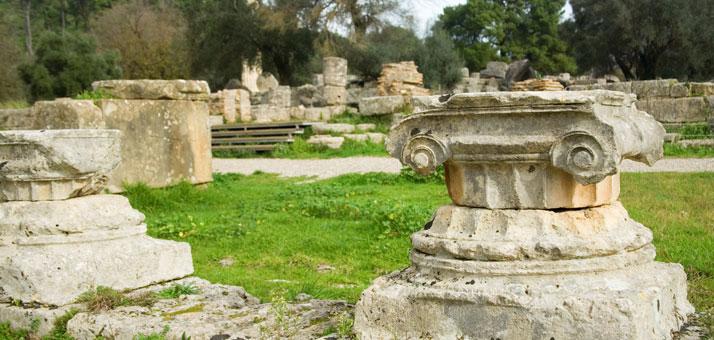
In ancient Greek mythology, Hercules and the other semi-gods and heroes, with their actions and feats of daring, elevated to the level of the ideal the exploit and the medal bestowed for excellence. Physical exercise is interwoven with mental effort, offering, and moral elevation, consolidating the character of competitive spirit in Ancient Greece in a spirit of noble emulation for the peaceful coexistence between people.
The athletic contests of the prehistoric era and the funeral games in honour of the dead gradually evolved during ancient times into an authentic athletic spirit. Physical training was included in the basic education of the young. The citizen was trained in both competition and collaboration, resulting in progress, peaceful coexistance and physical and mental well-being. Participation in the games meant education for the soul, the Greek word for ‘recreation’ coming from two other Greek words meaning ‘leading/training of the soul.’
Despite their differences and fierce competition, what was common between the city-states –religion, the heroes and mythology, language, ideals and education, and the pursuit of balanced cultivation of the body, mind and soul– helped some local games to acquire a national character and act as a bridge to unite all Greeks and strengthen the common Greek consciousness and identity.
Ancient Panhellenic Games had a sacred character and were held in stadiums and theaters in sanctuaries, as they were not only athletic competitions but also artistic events. The four panhellenic games never coincided, the entire Greek world observed the rules and above all, the sacred truce, that was an integral part of the games. Before, during and after the Ancient Panhellenic Games, all hostilities were suspended in order to enable the athletes to travel and take part in the games. All Greek citizens were entitled to participate, unless they had committed murder or sacrilege or had violated the sacred truce.
The ancient Panhellenic Games gained such a prestige that both athletes and spectators of the games at Olympia, Delphi, Isthmus and Nemea, flocked from all over the Greek world: from mainland Greece, its islands, the cities of Asia Minor and the distant colonies –from the Black Sea and Crimea to Magna Grecia (Southern Italy) and from Egypt to the Pillars of Hercules (now Gibraltar). The prize was only a wreath, but the moral reward was eternal glory and honor for themselves and their native city.
The competitions were held in the sacred precincts of each sanctuary. Originally, the only competition was a stadium-length foot race, known as stadion, while over time more race competitions were added: diaulos (double-stadion race), hoplitodromos (race in armour), and dolichos (long distance race). Additional events were gradually added to include the pentathlon (discus, javelin, long-jump, wrestling and foot race), wrestling, pygme, pankration, long-jump, discus and javelin, chariot racing and various equestrian competitions. Simultaneously, along with the athletic competitions, music, drama, poetry and visual arts contests were held.
